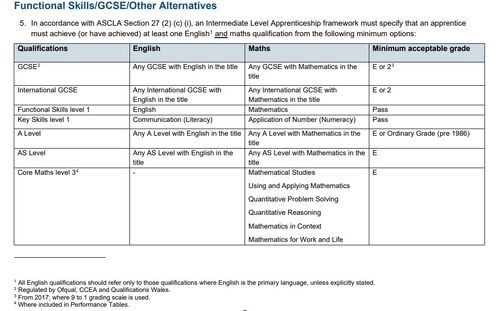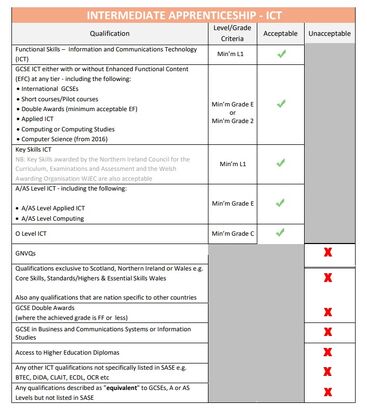Apprenticeships are jobs for people aged 16 and over which include training, and which earn you a qualification as well as a wage. They appeal to many home-educating families because you do not have the expense and practical difficulties of arranging to take qualifications independently. Some apprenticeships do not require any qualifications to apply, but the majority ask for at least English and maths.
Apprenticeships are paid jobs where 20% of the working time must be spent in training. Pay and conditions vary between employers, and so do entry requirements. There are advantages for employers in taking on apprentices rather than regular employees - they receive government contributions towards training costs, and the minimum wage for apprentices is lower. This encourages employers to make more apprenticeships available.
For other options, please see Home Education at Age 16+.
Please note - most of the information on this page refers to apprenticeships in England, but where we have information on the requirements for other parts of the UK, these are included. If you have more information about any differences in rules for other parts of the UK, please leave a reference and a note in comments, or add the information to the wiki yourself. Thank you.
What are the different Apprenticeship levels?[]
Traineeships[]
For people who aren't ready for a full apprenticeship yet. A structured work-experience programme. See Traineeships, below.
Intermediate Apprenticeships[]
Intermediate Apprenticeships are the first step on the ladder. You leave with a level 2 qualification equivalent to 5 good passes at GCSE. Entry requirements vary - many employers would like you to have GCSE English and maths, or an equivalent like Functional Skills, but usually they won't ask for more than a few. Some don't have any GCSE requirements.
Advanced Apprenticeships[]
The next ones up are Advanced Apprenticeships, which give you a Level 3 qualification roughly equivalent to two A-levels. Most specify that you must have English and maths GCSE or equivalent. Many require 4 or 5 GCSE passes. However, some do not have any GCSE requirements. You need to have obtained a Level 2 pass in English and maths before completing an Advanced apprenticeship. This can be Functional Skills level 2, or GCSE or IGCSE grade 4 / C. Depending on the specific apprenticeship framework, you may also need an ICT qualification at the same level. For a complete list of which qualifications meet the requirements, see Transferable Skills Guidance August 2018 or later guidance from Apprenticeship Certificates England.
UCAS guide to Advanced Apprenticeships
Higher Apprenticeships[]
Higher Apprenticeships allow you to gain a Level 4 qualification such as NVQ Level 4, HND, or a foundation degree. Most require you to have 5 good GCSE passes plus some relevant work experience. The Times says "More than 36,000 higher apprenticeships were taken up last year [2017], but fewer than 10 per cent were school-leavers.". From The Times Elite Apprenticeships - detailed article on Higher and Degree Apprenticeships.
UCAS guide to Higher Apprenticeships
Degree Apprenticeships[]
Degree apprenticeships allow you to earn a degree without paying fees or incurring debts, and while earning a wage. It takes up to six years to complete your degree alongside your employment. Degree apprenticeships are only available in certain employment sectors and there can be a lot of competition for jobs. Most require UCAS points, ie Level 3 qualifications, as well as Level 2 qualifications in English and maths. However, some will take you on with fewer qualifications.
Degree Apprenticeships article by Prospects, the careers service charity.
UCAS on Degree Apprenticeships
Not Going to Uni - lots on degree and higher apprenticeships.
You may be able to enrol on an Advanced Apprenticeship and continue to Higher and then Degree level with the same employer.
The Times Guide to Elite Apprenticeships Supplement is a useful and inspiring read: 2018, 2017 and 2016.
For more on all types of apprenticeships, see the Apprenticeships Guide for England , Apprenticeships.Scot for Scotland and Careers Wales - Apprenticeships.
What qualifications do I need for an Intermediate Apprenticeship?[]
There are no minimum qualification requirements for apprenticeships, but that doesn't mean that you can just walk into one with no GCSEs. Each employer sets their own requirements and many want a certain number of GCSEs, though some don't require any. To see how it varies for your own area, go to Find An Apprenticeship and select an apprenticeship level, and browse through what's available nearby. What are the different Apprenticeship levels?, above, gives a summary of typical requirements for each apprenticeship level. Note that you may have to really persevere to find an apprenticeship as sometimes the recruitment process is lengthy or inefficient - see Apprenticeship Questions below.
It's always worth applying and explaining if there are special circumstances which meant that you couldn't sit as many GCSEs as they require, eg it was too expensive to take the exams as an external candidate. If they are looking at the exams as a guide to your overall ability level, you may be able to argue your case.
What about English and maths GCSEs?[]
For an Intermediate Apprenticeship (level 2) in England, you need English and maths qualifications at a minimum of:

- Functional Skills Level 1, or
- GCSE or IGCSE grade 2 or E
There are other qualifications which meet the requirements as well, eg Scottish, Welsh and Northern Irish qualifications and IB Middle Years. See References.
If you don't already have the grade required for your apprenticeship in English and maths GCSE or IGCSE or Functional Skills, the employer has to enrol you on a course to study either GCSE or Functional Skills maths and English during your apprenticeship. The employer doesn't have any choice about this - it's part of the government's requirements for the apprenticeship scheme. This can be inconvenient for the employer and for the apprentice, so quite a few apprenticeships are only open to people who already have these qualifications. If you can get these qualifications under your belt before applying then you will have a greater choice of apprenticeships to choose from.
Will these always meet the requirements?[]
Your Apprenticeship trainer may ask for Level 2 (GCSE Grade 4/ C or higher) as well. See References. [2]. However, the minimum requirement is as described above.
For Intermediate Apprenticeships (Level 2), you should always be exempt if you have a Level 2 pass.
If you already have Functional Skills Level 2 passes in maths and English then you should not have to continue studying these as part of an Intermediate Apprenticeship. Note that this is different from going to college to study for Level 3 qualifications at 16-19; having Functional Skills doesn't exempt you from continuing to study for the GCSEs in these subjects at present.
The advantage of doing functional skills instead of maths and English GCSEs is that although the functional skills are the same level, level 2, they have much less content. In terms of learning hours the GCSEs are supposed to be about 120 hours each whereas functional skills are about 45 hours each.
Do I need an ICT qualification?[]

Transferable Skills for Apprenticeships - ICT qualifications meeting the requirements.
This depends on which apprenticeship you're doing, and whether it's considered relevant to the job. Many apprenticeships don't include this requirement. If ICT is included in the Apprenticeship Framework for your apprenticeship at Intermediate level, then you will need to either have, or gain, one of the following:
- Functional Skills ICT Level 1
- IGCSE or GCSE Computing, Computer Science or ICT at Grade 2/ E or above
- Key Skills ICT Level 1
Summary of what qualifications you need and what you leave with[]
Extract from All About School Leavers article about apprenticeships about apprenticeships:
- Intermediate Apprenticeships are the first level of apprenticeship. An Intermediate Apprenticeship is a Level 2 qualification, equivalent to five good GCSE passes. Intermediate apprentices work towards work-based learning qualifications such as an NVQ Level 2, Key Skills and, in most cases, a relevant knowledge-based qualification such as a BTEC.
- As the first level, Intermediate Apprenticeships are open to people with less academic qualifications than other levels of apprenticeships. Employers might ask for two or more GCSE grades (A*-C) or equivalent.
- For some intermediate apprenticeships, however, you might not need any formal qualifications. If you don’t have GCSEs in English and Maths, though, you’ll usually be required to take a basic numeracy and literacy test.
- As part of the intermediate apprenticeship, you’ll then either take a GCSE qualification in English or a Functional or Key Skills qualification at either Level 1 or Level 2. If you don’t quite meet the entry requirements, employers offer traineeships – short work programmes – to up-skill young people in English, maths and workplace skills, preparing them properly to start an apprenticeship.
For a complete list of which qualifications meet the requirements, see Transferable Skills Guidance August 2018 or later guidance from Apprenticeship Certificates England.
Apprenticeship Questions[]
Here are some questions and answers on apprenticeships - please add your own question in the comments at the foot of the page if it's not answered here.
How long does an apprenticeship take? []
Intermediate apprenticeships have to take at least a year, but can take longer than that. For apprenticeships of other levels, again the minimum is a year but a degree apprenticeship can take 5 or 6 years. IT varies between jobs.
How can I find an apprenticeship?[]
Search the government apprenticeship database. You can specify area, type of job etc. You will also see employers advertising for apprentices directly, and some agencies advertise apprenticeship positions. You may need to persevere and to check that the company did actually receive your application. Here's a comment on apprenticeship recruitment from the reader of an article in The Times:
"My son.. applied to numerous schemes, filling in massive forms each time, and never heard a word from the college or company managing the vacancy. For one job he really wanted he rang the employer direct - to be told they had given up in despair at the low quality of obviously unscreened applications, which did not include his in spite of him repeatedly calling the company handling the applications - and they hired a trainee through Indeed. ..In my line of work I took on two apprentices, both through a local college, but again I was sent a large number of totally unsuitable applicants, unfair to them as well as me, and we ended up finding our own people and organising the apprenticeship through the college afterwards." [Source]
If you are completing an apprenticeship, does the training always happen in College?[]
No; the training provider can be a college or a uni, or it can be a company which comes to the workplace to deliver the classes, or it can be a small firm that you go to. You may have distance learning courses too, eg some online learning.
What percentage of the apprenticeship would be theory based?[]
Hard to say. The idea is that mainly it's a full-time job, but 20% of your contracted hours have to be training. The training doesn't have to be theory. It can include shadowing people, lectures, role-playing, practical training etc. The point is it has to be training which isn't part of the regular job you're doing. BUT VERY IMPORTANT NOTE: This excludes the English and maths requirements. If you already have English & maths then you have to do English and maths classes PLUS 20% of the job training.
Source: Apprenticeships - off-the-job training requirements guidance for employers, from the Department for Education.
If you don't like it, can you transfer to a different apprenticeship?[]
Yes, you can transfer between apprenticeships if both employers agree, though it may be hard to arrange - see Apprenticeship Transfers from BrightKnowledge.
My friend did an apprenticeship and didn't like it.[]
There are many different apprenticeships, so don't assume that what applied to someone at one firm will be the same at others. See Rate My Apprenticeship for reviews, and 'How to spot a fake apprenticeship'.
I don't have many GCSEs and can't find an apprenticeship I like :-([]
You don't have to get an apprenticeship if you're aged 16-19; you can apply for normal jobs too, though it will cost the employer more to take you on.
See our Sixteen Plus page for more on when you can legally leave education, what 'raising the participation age' means in practice, and your options for getting qualifications.
If you're aged 19+, look at our Adult Education page to see options for gaining more qualifications. You may well be able to go to college free.
At any age, you could consider a Traineeship instead.
Traineeships[]
What is a Traineeship?
A 'Traineeship' is a form of structured work experience below the level of apprenticeship. It's aimed at those who are interested in an apprenticeship but aren't ready for it yet, or can't find an apprenticeship yet.
From the Government's Find A Traineeship site:
A traineeship is a course with work experience that gets you ready for work or an apprenticeship. It can last up to 6 months.
You can apply if you’re:
eligible to work in England
unemployed and have little or no work experience
aged 16 to 24 and qualified below Level 3
You’ll get:
a work experience placement
help with English and maths (if you need it)
You won’t be paid, but you may be given expenses for things like travel and meals.
More Traineeship links:[]
What is a Traineeship? from All About School Leavers.
Apprenticeships Links[]
Find An Apprenticeship - the government's apprenticeship database. Separate links for England, Scotland and Wales from this page.
Government Guide to Apprenticeships in England - guide for potential apprentices
Apprenticeships - training requirements guidance for employers, from the Department for Education.
More technical detail in Apprenticeship Funding Rules and Guidance for Employers.
Hiring and Training an Apprentice - guidance for employers, from the Department for Education
The Student Room Apprenticeships hub - introductory articles and forums.
Getting An Apprenticeship - from All About School Leavers lots of articles on , eg, apprenticeships in different subject areas, and on avoiding dodgy apprenticeships.
Rate My Apprenticeship - Apprenticeships, Jobs, Reviews & Careers Advice For School & College Leavers
UCAS Entry Requirements for Apprenticeships in England has a useful overview of typical entry standards for each level of apprenticeship.
notgoingtouni.co.uk showcases "the opportunities that exist outside of traditional university such as apprenticeships, sponsored degrees, diplomas, gap years, distance learning and jobs. However we are not anti-uni."
Careers advice: Apprenticeships , from Prospects, the careers service charity.
The Times Elite Apprenticeships - thorough article about apprenticeships, and listings of Higher and Degree Apprenticeship vacancies.
Apprenticeship Training - myth versus fact. Aimed at employers but useul as it explains the different forms that training during an apprenticeship can take.
References[]
- English and maths requirements for Apprenticeships:
Specification of Apprenticeship Standards for England (2018), p 7-10.
2. English and maths can be required at Level 2 on occasion:
14. Developers of Intermediate Level frameworks can choose whether to set the requirement for Functional Skills at Level 1 or Level 2, and GCSEs at minimum grade E or minimum grade C. The framework developer should be proactive in considering the scope to set the threshold at Level 2 or minimum grade C.
From Specification of apprenticeship standards for England (SASE): guidance p7, and :
16. To promote progression, where an individual has achieved a qualification at Level 1 or equivalent in either mathematics, English or ICT (if the framework requires this), the apprentice should study for a GCSE or Functional Skills qualification at Level 2 as part of an Intermediate Level Apprenticeship. Under current funding arrangements apprentices can be funded to achieve either GCSE qualifications or Functional Skills qualifications at Level 2 in English, mathematics and ICT.
(page 8)
See also Transferable Skills for Apprenticeships 2018 for more detail on these and ICT requirements, and other documents from Apprenticeship Certificates England, which is the certifying body for apprenticeships in England.
